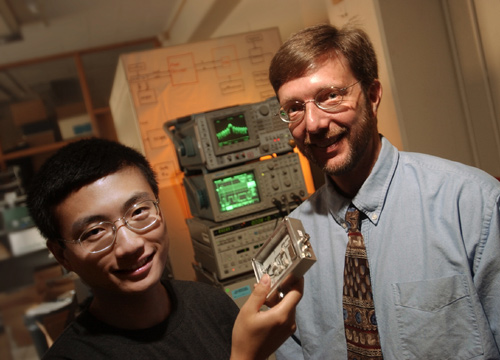Guangxi Wang ’03 of Shanghai, China, did research on the biomedical applications of microwave enhanced liposuction (MEL), with William D. Jemison ’85, assistant professor of electrical engineering, as an EXCEL Scholar during interim session.
The project, which addresses the design and analysis of antennas used for biomedical applications in such procedures as deep-seated brain tumors or heart surgery, will continue this summer.
“Microwaves are being used more frequently in diagnostic and therapeutic medicine,” Jemison says. “MEL is a new technique where a microwave antenna is inserted into the body’s fatty tissue to heat it prior to the tissue’s suction through a tube used in surgery called a cannula. This process is desirable because it allows heating to occur along the transmission line of these tiny tubes and keeps fat from getting coagulated in them during complex surgical procedures.”
Jemison and Wang analyzed existing MEL biological antenna designs and proposed improvements. Wang, who is majoring in electrical and computer engineering with a minor in mathematics, developed computer-simulated antenna models, ran simulations, and collected data.
“Professor Jemison gave me instructions and background knowledge essential to understanding the underlying theories,” Wang says. “He also gave me lots of insight into the project, especially the generic methodology of conducting research.”
“My hope is that Guangxi will learn about this project in great detail and make a contribution to the field,” he says. “For a student considering graduate school, EXCEL research of this nature will be looked upon favorably.”
“I hadn’t done any formal research before I came to Lafayette, so this opportunity was a good beginning for me in this new field,” Wang says. “This project was rewarding, because it has expanded my research skills and allowed me to explore unknown areas instead of just learning from books.
“Lafayette provides excellent opportunities to access faculty research resources. Such opportunities are not common in most other schools, and they are very beneficial to students who wish to accumulate research experience for their future career,” he adds.
More than a dozen Lafayette undergraduates have worked with Jemison in his research since he joined the faculty of his alma mater in 1996. In addition to potential applications for antennas in biomedical treatments, his research includes technology to develop wireless local area networks that can deliver data 10 to 100 times faster than can be done today; microwave/photonic techniques for high-speed data modulation; and power amplifier modeling.
Wang is a member of the McKelvy House Scholars Program, in which 19 students of high academic achievement and promise reside together in a historic off-campus house and participate in shared intellectual and social activities. This spring he received Lafayette’s Eugene P. Chase Phi Beta Kappa Prize, awarded to a sophomore who has demonstrated scholarship as a first-year student.
Wang led Lafayette to an extremely impressive showing in the 61st Annual William Lowell Putnam Mathematical Competition in December. The team also included Brian Bagenstose ’01, an electrical and computer engineering major from Reading, Pa., and Bruce Adcock ’01, a math major from Watervliet, N.Y. Lafayette finished 40th, placing in the top 10 percent of the 434 participating institutions nationwide. Wang’s individual performance put him among the top 11 percent of the 2818 individual competitors.
“This is the best performance Lafayette has ever had,” says adviser Derek A. Smith, assistant professor of mathematics.
In February, Wang teamed with Lazar Nikolic ’02, a math and computer science double major from Roswell, Ga., and Daniel Swarr ’02, a math and physics double major from Clifton Park, N.Y., to place in the top 14 percent of participating teams and earn the second-highest rating in the 17th annual international Mathematical Contest in Modeling, sponsored by COMAP, the Consortium for Mathematics and its Applications. Advising the team was L. Thomas Hill, associate professor of mathematics.
Wang, Swarr and senior Feiyu Wang ’01, a dual-degree student in electrical engineering and economics and business from Beijing, China, joined forces to place first in Lafayette’s spring-term Barge Mathematics Competition and win a $600 prize. In the Barge competition, teams of three to five students solve one math problem each week for eight weeks. The problems were selected by Ethan Berkove and Derek Smith, assistant professors of math. The team finished second in the fall semester competition.
Wang is secretary of the Asian Cultural Association and a member of the International Students Association, the German Culture Club, and the Math Problem Group.
He volunteers through the Landis Community Outreach Center, is a tutor, computing service student associate, participates in intramural sports, and is a chess tournament prize winner.
Jemison graduated from Lafayette in 1985 with a B.S. degree in electrical engineering. Part of his research at Lafayette is supported by the National Science Foundation and the Office of Naval Research. He has authored or co-authored about 40 publications, including a book chapter. He also holds three U.S. patents.
Jemison holds a Ph.D. in electrical engineering from Drexel University and an M.S. in engineering science from Penn State. He is a member of Eta Kappa Nu, the national honor society for electrical engineers, and a senior member of the Institute of Electrical and Electronics Engineers. Prior to joining the Lafayette faculty he was a senior project engineer for Flam and Russell, Inc., Lockheed Martin Corp, and the Naval Air Warfare Center.

IIE Scholarship. Guangxi Wang ’03 received a Microwave Theory and Techniques Society Scholarship. He did research with the guidance of William Jemison ’85, associate professor of electrical and computer engineering.
